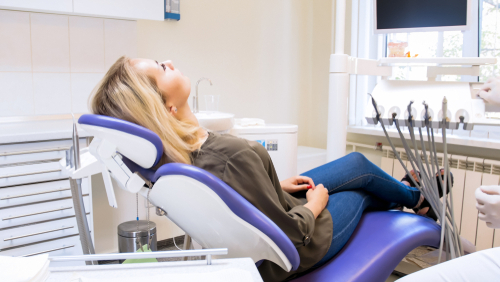Did Your Dental Crown Break or Fall Out? Silver Spring Dentist Dr. Bassford Is Here to Help
Have you had a dental crown placed that has fallen out or appears to be broken? Despite their durability, dental crowns can sometimes suffer damage, requiring emergency dental treatment to prevent further complications.
If you have a broken crown on your tooth, or your crown is missing, you may be wondering what steps to take. Silver Spring emergency dentist, Dr. Alice Charland Bassford recommends contacting ASE Dental immediately if you’re looking for prompt treatment. At our Silver Spring dental office, we’ll help get your oral health back on track—call (301) 593-5500. We also proudly welcome patients coming from Bethesda, Takoma Park, Wheaton, and the surrounding areas.

What Is a Dental Crown?
A dental crown is a tooth-shaped cap or covering placed over an existing tooth to restore its shape, size, strength, and appearance. Dental crowns are essential for protecting teeth that are weak, broken, or decayed, and they can also enhance the look of teeth that are stained or misshapen.
These crowns can be crafted from various materials, including porcelain, zirconia, gold alloy, or a combination of porcelain and metal, each offering different benefits in terms of durability and aesthetics.
Causes of Broken Dental Crowns Near Bethesda, MD
Dental crowns can break or become dislodged due to various reasons:
- Trauma: Direct impact to the mouth or face.
- Chewing Hard Foods: Biting down on hard objects or foods.
- Tooth Decay: Underlying decay weakens the tooth structure.
- Age: Wear and tear over time.
- Faulty Crown Fit: Improper placement or fit of the crown.
- Grinding Teeth: Bruxism (teeth grinding) can stress the crown.
- Poor Oral Hygiene: Neglecting oral care leads to decay around the crown.
- Root Canal: Significant decay may require a root canal before fitting a new crown.
Symptoms of a Broken Dental Crown
Recognizing the signs of a broken dental crown can help prompt timely intervention:
- Visible Damage: Cracks, fractures, or pieces missing from the crown.
- Tooth Sensitivity: Sensitivity to hot, cold, or sweet foods and beverages.
- Pain or Discomfort: Especially when chewing or biting down.
- Looseness: Feeling that the crown is loose or unstable.
- Gum Irritation: Irritation or inflammation around the crowned tooth.
Immediate Actions to Take for a Broken Crown During a Dental Emergency
When faced with a broken dental crown, you need to take these immediate steps:
- Retrieve the Crown: If possible, locate and keep the broken crown pieces.
- Rinse: Gently rinse your mouth with warm water to clean the area.
- Pain Relief: Over-the-counter pain relievers can help manage discomfort.
- Avoid Chewing: Refrain from chewing on the side with the broken crown.
- Contact Our Silver Spring Dentist: Schedule an emergency appointment with our dentist.
Temporary Solutions for a Broken Dental Crown in Silver Spring, MD
Use Temporary Dental Cement
Temporary dental cement is useful for managing a broken dental crown and a temporary crown. Available at most drug stores, it can reattach a small broken piece or cover the exposed tooth, protecting it until you see your dentist. Designed for dental emergencies, it helps keep the underlying tooth safe from further damage.
Remember, this is a temporary fix, and you should contact our dentist in Silver Spring, MD, soon for a permanent solution.
Apply Dental Wax
Dental wax is another effective temporary solution for a broken crown. It can cover the sharp edges of the broken crown, preventing irritation to your gums and mouth. This measure ensures comfort and prevents further injury while waiting for your dental appointment.
Avoid Hard and Sticky Foods
Avoiding certain foods is essential to prevent further complications from a broken dental crown. Hard foods like nuts and candies, and sticky foods like gum and caramel, can cause additional damage or dislodge the crown further. Stick to softer foods that require minimal chewing to protect the broken crown until professional care is available.
How to Protect Your Tooth
Protecting the exposed, natural tooth is crucial to avoid infections and further damage. Temporary dental cement or denture adhesive can temporarily shield the tooth. Over-the-counter pain relievers and cold compresses manage discomfort and reduce swelling.
Good oral hygiene is also essential. Here are some tips to maintain it:
- Gently rinse your mouth with warm water.
- Avoid irritating substances to keep the area clean.
- Avoid crunchy, chewy, or tough foods that can aggravate the exposed tooth and delay healing.
Dental Emergency: When to Seek Immediate Attention
If you have a broken crown, it’s crucial to seek immediate attention from a dentist. A broken crown can quickly escalate into a dental emergency, especially if it leaves jagged edges that can cut your tongue or cheeks. If you experience any of the following symptoms, contact our Silver Spring emergency dentist immediately:
- Severe toothache or pain
- Swelling or bleeding around the affected tooth
- A loose crown or one that has fallen out
- Visible cracks or chips in the crown
- Sensitivity to hot or cold food and drink
Prompt action can prevent further damage and alleviate discomfort, ensuring your oral health remains intact.
Repairing or Replacing a Broken Crown Near Takoma Park, MD
Assessing the Damage
To assess the damage, our Silver Spring emergency dentist will typically remove the broken crown and evaluate any underlying issues with the tooth structure. Keeping the broken crown to show your dentist can help understand the damage and determine the best course of action.
The Dental Crown Procedure
The dental crown procedure typically requires one or two visits to the dentist or prosthodontist. During the first visit, a Silver Spring dentist near you will:
- Prepare your tooth by removing a layer of its outer surface and shaping it
- Use a local anesthetic to numb the area
- Take an impression or digital scan of the tooth to capture its exact shape
- Send this information to a lab where a technician will craft the crown to fit your tooth precisely
While waiting for your permanent crown, your Silver Spring emergency dentist will place a temporary crown over the affected tooth to protect it. Once your permanent crown is ready, you will return for a second appointment to have it fitted and secured in place using dental cement or adhesive.
Proper care is essential to ensure your dental crown lasts for many years. This includes:
- Brushing your teeth twice a day with fluoride toothpaste and a soft-bristled toothbrush
- Flossing regularly to prevent tooth decay and gum disease
- Attending regular dental check-ups to monitor the condition of your crown and overall oral health
By following these steps, you can help maintain the integrity of your dental crown and enjoy a healthy, beautiful smile.
Repairing the Existing Crown
If the crown is intact but loose, it can often be easily reattached. In many cases, a damaged dental crown can be repaired instead of completely replaced, saving time and cost. Our Silver Spring dentist will clean the underlying tooth and apply dental cement to secure the crown.
The appropriate treatment for a broken dental crown depends on the severity of the damage:
- Crown Repair: If the damage is minimal, your dentist may be able to repair the crown.
- Crown Replacement: Extensive damage may require replacing the crown entirely.
- Temporary Measures: Our Silver Spring dentist may apply a temporary crown or protective covering until a permanent solution is ready.
- Evaluation: Dr. Bassford will assess the underlying tooth to ensure no further complications exist.
Getting a New Dental Crown
A severely damaged dental crown can’t be repaired and must be replaced. A new crown can be made by our Silver Spring emergency dentist or a specialty laboratory, using impressions or digital scans to create a precise fit. Dental crowns typically last between 10 to 15 years, but a new crown ensures continued protection and functionality of the tooth.

Frequently Asked Questions
If your dental crown breaks, you may expose sensitive tooth structures, causing discomfort or pain. Contact your dentist immediately for an emergency dental crown treatment to ease your pain and prevent further damage to your natural teeth.
It is possible to use temporary dental cement from a drug store to reattach a broken dental crown or cover the exposed tooth until you can visit your dentist. However, professional dental care is recommended for a lasting solution.
To protect your broken dental crown, you should avoid hard and sticky foods like nuts, candies, and chewing gum. Instead, opt for softer foods that require minimal chewing to prevent additional damage.
To protect your dental crowns from future breakages, ensure you attend regular dental check-ups, practice proper oral care, and utilize mouthguards during sports or while sleeping. These measures will significantly enhance the longevity of your crowns.
If Your Dental Crown Falls Out or Breaks, Contact Our Silver Spring Dentist!
For personalized advice or immediate assistance with a broken dental crown, don’t hesitate to reach out to our trusted dental professional. To schedule your emergency appointment near Bethesda, MD, contact our emergency dentist in Silver Spring by calling (301) 593-5500. We also proudly welcome patients coming from Bethesda, Takoma Park, Wheaton, and the surrounding areas.
